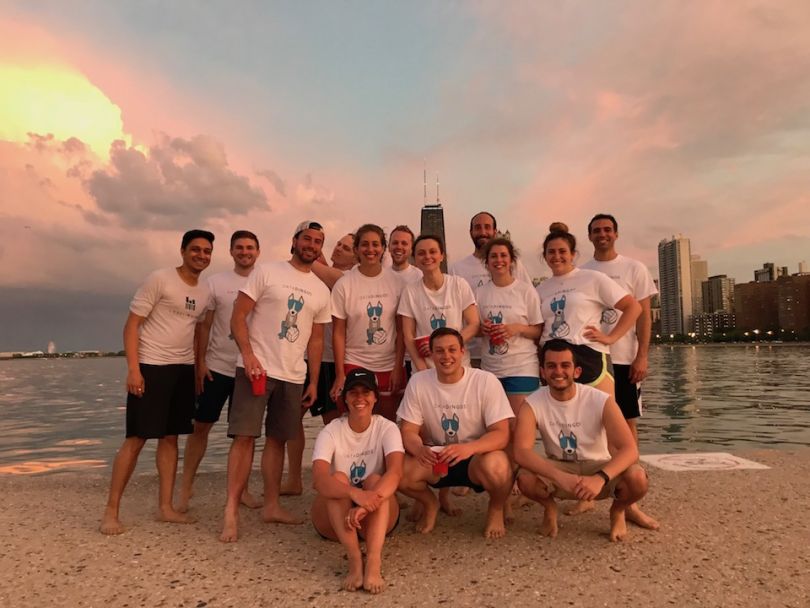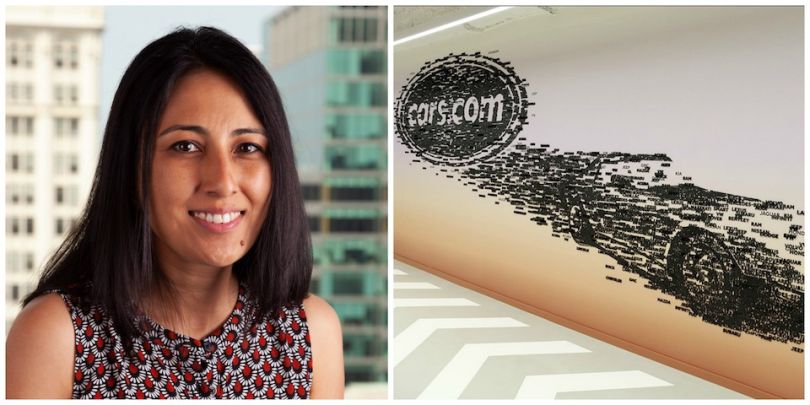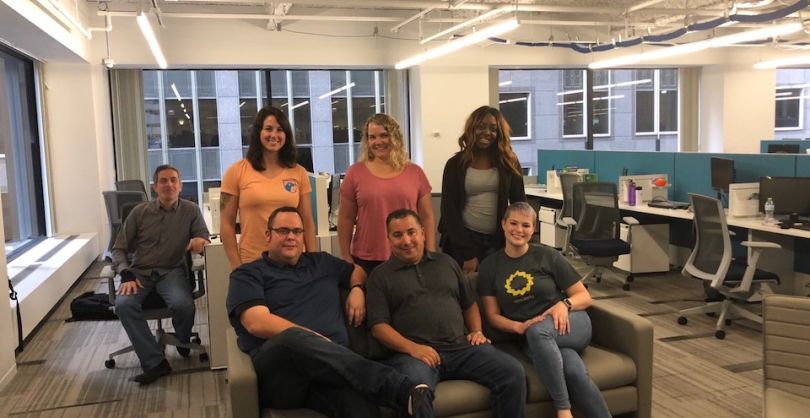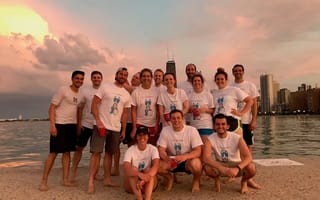When it comes to leading teams, there’s always a learning curve. First-time leaders often face a steeper curve, but even seasoned veterans who step into new roles will find they have a lot to learn. We recently spoke with leaders at five Chicago tech companies to learn more about their first years in leadership.

Label Insight’s big data platform helps manufacturers and retailers paint a clearer picture for consumers of what’s in the food they buy. Director of Architecture Jim Shedlick describes his role as a cross between an architect and an engineering manager. As such, it only makes sense that one of the biggest challenges he faced in his first year involved both scaling tech and teams.
What was the biggest challenge you or your team had to overcome in your first year?
Scaling our product architecture and deployment pipelines to meet the needs of our growing team and to allow them to work autonomously. We grew from two to five cross-functional teams. We doubled down on our microservices architecture and split previously combined applications. We also rolled out a feature toggles tool, an analytics pipeline for capturing and visualizing metrics, a real-time monitoring framework and an alerting platform. With all the pieces in place, we launched a DevOps group with engineers from each cross-functional team rather than having a dedicated DevOps team.
What were the three biggest lessons you learned in that first year?
- Solving technical problems is only the first step in solving real business problems. The latter requires working outside of engineering to understand the company’s vision and business processes in order to drive change where technology can provide operational efficiency or innovation.
- Having engineers work side by side with those in direct contact with customer problems leads to better solutions. We’ve been working to instill an objective-based culture, and we expect our engineers to question why they’re building something.
- The lesson for me as an engineering leader is that often, my best course of action is to arm our engineers with principles and tools that let them bring it home.

Cars.com’s two-sided marketplace connects car shoppers across the country with local dealerships. Senior Director of Data Management and Platform Luna Rajbhandari heads up the company’s data management function and leads a team of engineers, data scientists and analysts. Rajbhandari joined the company when it was just starting to explore the importance and potential of data, which presented her and her team with unique opportunities and challenges.
What was the biggest challenge you or your team had to overcome in your first year?
When I first joined Cars.com, we were going through a major front end tech stack re-platforming effort and were just starting to talk about data and its potential. Making data and analytics core to our strategic advantage required my teams to go through multiple transformations, including establishing capabilities in data science and machine learning, upskilling existing data teams on cloud and big data platforms, and encouraging new ways of working and collaborating across teams while providing space to innovate with an empowered mindset.
What was the biggest lesson you learned in that first year?
In my last two-plus years at Cars.com, I have seen the company go through quite a bit of transformation. I have been lucky to have been given numerous opportunities to apply my leadership skills and to take on some very exciting responsibilities. I have learned that organizations can be super dynamic, and that people and organizational mindsets can evolve quite rapidly in a changing business landscape. Cars.com today is a very energetic and dynamic organization with tons of opportunities to make a real impact.

StratEx’s cloud-based software provides businesses with a single place for managing all their HR needs, from benefits administration and payroll solutions to recruiting and candidate tracking. Client Services Manager Libby Harris leads the company’s service team, which also involves acting as an internal client advocate. Since stepping into a larger leadership position, Harris said she’s learned about the importance of finding out what truly motivates the members of her team.
What was the biggest challenge you or your team had to overcome in your first year?
We recently changed our service structure to improve our client experience. This involved combining two previously separate teams serving different sets of clients into one team serving all clients. The team had to overcome a backlog of cases as well as get to know a whole new set of clients. It took some open minds and hard work, but we are one fully united team that is serving our clients much better. We very quickly saw an improvement in response times as well as streamlined processes.
What were the three biggest lessons you learned in that first year?
- Don’t get mad, get what you want. As the pressure of a growing team weighed on me, I would go into meetings ready to prove why I was right. These discussions didn’t get very far, and in focusing on my team, I failed to realize where we were going as a company. I’ve worked hard to go in with the facts as to what is needed and why, while being more ready to hear other sides.
- Find what motivates people. Sometimes it’s money, but a lot of times that’s not everything, or even enough. Identifying what motivates someone is important for keeping them engaged and wanting to continue to do their best work. Recognizing this allows for a better relationship with people as you know what matters and can focus conversations on that.
- My attitude affects the team. I don’t often get to hear when things go well, and this can get to anyone after a while. Even though I was never communicating my bad vibes directly, my attitude was affecting my team. Taking time to adjust my attitude was important to making sure I wasn’t letting my passing frustrations affect how my team communicated.
Connamara Systems provides software engineering services for financial institutions, which include everything from marketplaces and exchanges to trading platforms. On projects, Business Analyst Manager Andrew Page serves in a project manager capacity. Page said one of his biggest takeaway from his first year leading a team and being a client’s point person was to listen as much as possible.
What was the biggest challenge you or your team had to overcome in your first year?
There were two primary challenges: writing and managing a suite of acceptance tests and working with software engineers on the project team to pass the tests. The first year also involved understanding how to set up a project in a way that minimized the risk of wasted time for developers, while also minimizing the risk of client disengagement. I also learned a lot about always being available and ready to answer questions and always proactively reporting the project status to client stakeholders.
What were the three biggest lessons you learned in that first year?
- Listen to team members and to clients. People often do your work for you by exploring solutions to engineering problems as they explain them. Listening improves your chances of succeeding, and it also helps build good relationships.
- Be proactive with communication inside and outside the project team. The client should never need to ask us for a status update.
- Write acceptance tests that have clarity for the client to read and understand. It is important for the client, through the acceptance tests, to have a precise knowledge of what is being implemented, while giving engineers the correct level of detail to implement the requirement expressed in the test.

Using artificial intelligence and machine learning, seoClarity’s platform provides companies with data and insights designed to help them up their search rankings. Associate Director of Client Success Chris Kanellakes recruits, trains and manages the company’s client success team. Kanellakes said that one of the biggest things he’s learned since joining the team is that while seoClarity’s tech is constantly evolving, its approach to helping customers has stayed consistent.
What was the biggest challenge you or your team had to overcome in your first year?
To learn the most I could about our clients. What really helped me initially was getting in front of as many clients as I could to understand their experiences and unique challenges. My next challenge was understanding how to help clients at all phases of their journeys. Our team continues to work to understand our clients’ needs so that we can streamline workflows that fit to ensure the greatest SEO success along each of their individual paths.
What were the three biggest lessons you learned in that first year?
- Our clients are the center of our universe. I came in with that mindset but was blown away with how that is truly engrained here.
- The digital landscape changes at a fast pace and our technology moves at lightning speed, but our approach is consistent: keep our clients focused on creating a great search experience for their customers and the rest will follow.
- Every day is different. Being agile, keeping an open mind and doing whatever it takes is paramount when working in a fast-paced environment.







